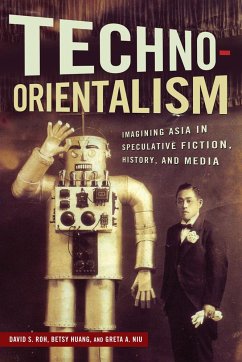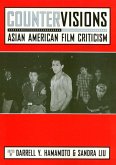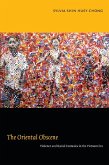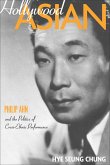Techno-Orientalism
Imagining Asia in Speculative Fiction, History, and Media
Herausgeber: Roh, David S; Niu, Greta A; Niu, Greta Aiyu; Huang, Betsy
Techno-Orientalism
Imagining Asia in Speculative Fiction, History, and Media
Herausgeber: Roh, David S; Niu, Greta A; Niu, Greta Aiyu; Huang, Betsy
- Broschiertes Buch
- Merkliste
- Auf die Merkliste
- Bewerten Bewerten
- Teilen
- Produkt teilen
- Produkterinnerung
- Produkterinnerung
What will the future look like? To judge from many speculative fiction films and books the future will be full of cities that resemble Tokyo and Shanghai, and it will be populated by cold, unfeeling citizens who act like robots. Techno-Orientalism investigates the phenomenon of imagining Asia and Asians in hypo- or hyper-technological terms in literary, cinematic, and new media representations.
Andere Kunden interessierten sich auch für
![Whitewashing the Movies Whitewashing the Movies]() David C OhWhitewashing the Movies34,99 €
David C OhWhitewashing the Movies34,99 €![Criminalization/Assimilation Criminalization/Assimilation]() Philippa GatesCriminalization/Assimilation42,99 €
Philippa GatesCriminalization/Assimilation42,99 €![Screening Asian Americans Screening Asian Americans]() Screening Asian Americans41,99 €
Screening Asian Americans41,99 €![Countervisions Countervisions]() Darrell HamamotoCountervisions37,99 €
Darrell HamamotoCountervisions37,99 €![Indiscreet Fantasies Indiscreet Fantasies]() Indiscreet Fantasies40,99 €
Indiscreet Fantasies40,99 €![The Oriental Obscene The Oriental Obscene]() Sylvia Shin Huey ChongThe Oriental Obscene43,99 €
Sylvia Shin Huey ChongThe Oriental Obscene43,99 €![Hollywood Asian Hollywood Asian]() Hye Seung ChungHollywood Asian30,99 €
Hye Seung ChungHollywood Asian30,99 €-
-
-
What will the future look like? To judge from many speculative fiction films and books the future will be full of cities that resemble Tokyo and Shanghai, and it will be populated by cold, unfeeling citizens who act like robots. Techno-Orientalism investigates the phenomenon of imagining Asia and Asians in hypo- or hyper-technological terms in literary, cinematic, and new media representations.
Hinweis: Dieser Artikel kann nur an eine deutsche Lieferadresse ausgeliefert werden.
Hinweis: Dieser Artikel kann nur an eine deutsche Lieferadresse ausgeliefert werden.
Produktdetails
- Produktdetails
- Verlag: Rutgers University Press
- Seitenzahl: 272
- Erscheinungstermin: 17. April 2015
- Englisch
- Abmessung: 228mm x 151mm x 22mm
- Gewicht: 377g
- ISBN-13: 9780813570631
- ISBN-10: 0813570638
- Artikelnr.: 41755082
- Herstellerkennzeichnung
- Libri GmbH
- Europaallee 1
- 36244 Bad Hersfeld
- gpsr@libri.de
- Verlag: Rutgers University Press
- Seitenzahl: 272
- Erscheinungstermin: 17. April 2015
- Englisch
- Abmessung: 228mm x 151mm x 22mm
- Gewicht: 377g
- ISBN-13: 9780813570631
- ISBN-10: 0813570638
- Artikelnr.: 41755082
- Herstellerkennzeichnung
- Libri GmbH
- Europaallee 1
- 36244 Bad Hersfeld
- gpsr@libri.de
Roh, David S.
Acknowledgments
Technologizing Orientalism: An Introduction
Part I Iterations & Instantiations
Chapter 1 Demon Courage and Dread Engines: America’s Reaction to the
Russo-Japanese War and the Genesis of the Japanese Invasion Sublime
Chapter 2 “Out of the Glamorous, Mystic East”: Techno-Orientalism in
Early Twentieth-Century United States Radio Broadcasting
Chapter 3 Looking Backward from 2019 to 1882: Reading the Dystopias of
Future Multiculturalism in the Utopias of Asian Exclusion
Chapter 4 Queer Excavations: Technology, Temporality, Race
Chapter 5 I, Stereotype: Detained in the Uncanny Valley
Chapter 6 The Mask of Fu Manchu, Son of Sinbad, and Star Wars IV: A New
Hope: Techno-Orientalist Cinema as an Mnemotechnics of 20th Century
U.S.-Asian Conflicts
Chapter 7 Racial Speculations: (Bio)Technology, Battlestar Galactica, and
Mixed-Race Imagining
Chapter 8 “Never Stop Playing”: StarCraft and Asian Gamer Death
Chapter 9 “Home Is Where the War Is”: Remaking Techno-Orientalist
Militarism on the Homefront
Part II Reappropriations & Recuperations
Chapter 10 Thinking about Bodies, Souls, and Race in Gibson’s Bridge
Trilogy
Chapter 11 Re-imagining Asian Women in Feminist Post-Cyberpunk Science
Fiction
Chapter 12 The Cruel Optimism of Asian Futurity and the Reparative
Practices of Sonny Liew’s Malinky Robot
Chapter 13 Palimpsestic Orientalisms and Antiblackness: Or, Joss Whedon’s
“grand vision of an Asian/American tomorrow”
Chapter 14 “How Does It Not Know What It Is?”: The Techno-Orientalized
Body in Ridley Scott’s Blade Runner and Larissa Lai’s Automaton Biographies
Chapter 15 “A Poor Man from a Poor Country”: Nam June Paik, TV-Buddha,
and the Techno-Orientalist Lens
Desiring Machines, Repellant Subjects: A Conclusion
Bibliography
Notes on Contributors
Index
Technologizing Orientalism: An Introduction
Part I Iterations & Instantiations
Chapter 1 Demon Courage and Dread Engines: America’s Reaction to the
Russo-Japanese War and the Genesis of the Japanese Invasion Sublime
Chapter 2 “Out of the Glamorous, Mystic East”: Techno-Orientalism in
Early Twentieth-Century United States Radio Broadcasting
Chapter 3 Looking Backward from 2019 to 1882: Reading the Dystopias of
Future Multiculturalism in the Utopias of Asian Exclusion
Chapter 4 Queer Excavations: Technology, Temporality, Race
Chapter 5 I, Stereotype: Detained in the Uncanny Valley
Chapter 6 The Mask of Fu Manchu, Son of Sinbad, and Star Wars IV: A New
Hope: Techno-Orientalist Cinema as an Mnemotechnics of 20th Century
U.S.-Asian Conflicts
Chapter 7 Racial Speculations: (Bio)Technology, Battlestar Galactica, and
Mixed-Race Imagining
Chapter 8 “Never Stop Playing”: StarCraft and Asian Gamer Death
Chapter 9 “Home Is Where the War Is”: Remaking Techno-Orientalist
Militarism on the Homefront
Part II Reappropriations & Recuperations
Chapter 10 Thinking about Bodies, Souls, and Race in Gibson’s Bridge
Trilogy
Chapter 11 Re-imagining Asian Women in Feminist Post-Cyberpunk Science
Fiction
Chapter 12 The Cruel Optimism of Asian Futurity and the Reparative
Practices of Sonny Liew’s Malinky Robot
Chapter 13 Palimpsestic Orientalisms and Antiblackness: Or, Joss Whedon’s
“grand vision of an Asian/American tomorrow”
Chapter 14 “How Does It Not Know What It Is?”: The Techno-Orientalized
Body in Ridley Scott’s Blade Runner and Larissa Lai’s Automaton Biographies
Chapter 15 “A Poor Man from a Poor Country”: Nam June Paik, TV-Buddha,
and the Techno-Orientalist Lens
Desiring Machines, Repellant Subjects: A Conclusion
Bibliography
Notes on Contributors
Index
Acknowledgments
Technologizing Orientalism: An Introduction
Part I Iterations & Instantiations
Chapter 1 Demon Courage and Dread Engines: America’s Reaction to the
Russo-Japanese War and the Genesis of the Japanese Invasion Sublime
Chapter 2 “Out of the Glamorous, Mystic East”: Techno-Orientalism in
Early Twentieth-Century United States Radio Broadcasting
Chapter 3 Looking Backward from 2019 to 1882: Reading the Dystopias of
Future Multiculturalism in the Utopias of Asian Exclusion
Chapter 4 Queer Excavations: Technology, Temporality, Race
Chapter 5 I, Stereotype: Detained in the Uncanny Valley
Chapter 6 The Mask of Fu Manchu, Son of Sinbad, and Star Wars IV: A New
Hope: Techno-Orientalist Cinema as an Mnemotechnics of 20th Century
U.S.-Asian Conflicts
Chapter 7 Racial Speculations: (Bio)Technology, Battlestar Galactica, and
Mixed-Race Imagining
Chapter 8 “Never Stop Playing”: StarCraft and Asian Gamer Death
Chapter 9 “Home Is Where the War Is”: Remaking Techno-Orientalist
Militarism on the Homefront
Part II Reappropriations & Recuperations
Chapter 10 Thinking about Bodies, Souls, and Race in Gibson’s Bridge
Trilogy
Chapter 11 Re-imagining Asian Women in Feminist Post-Cyberpunk Science
Fiction
Chapter 12 The Cruel Optimism of Asian Futurity and the Reparative
Practices of Sonny Liew’s Malinky Robot
Chapter 13 Palimpsestic Orientalisms and Antiblackness: Or, Joss Whedon’s
“grand vision of an Asian/American tomorrow”
Chapter 14 “How Does It Not Know What It Is?”: The Techno-Orientalized
Body in Ridley Scott’s Blade Runner and Larissa Lai’s Automaton Biographies
Chapter 15 “A Poor Man from a Poor Country”: Nam June Paik, TV-Buddha,
and the Techno-Orientalist Lens
Desiring Machines, Repellant Subjects: A Conclusion
Bibliography
Notes on Contributors
Index
Technologizing Orientalism: An Introduction
Part I Iterations & Instantiations
Chapter 1 Demon Courage and Dread Engines: America’s Reaction to the
Russo-Japanese War and the Genesis of the Japanese Invasion Sublime
Chapter 2 “Out of the Glamorous, Mystic East”: Techno-Orientalism in
Early Twentieth-Century United States Radio Broadcasting
Chapter 3 Looking Backward from 2019 to 1882: Reading the Dystopias of
Future Multiculturalism in the Utopias of Asian Exclusion
Chapter 4 Queer Excavations: Technology, Temporality, Race
Chapter 5 I, Stereotype: Detained in the Uncanny Valley
Chapter 6 The Mask of Fu Manchu, Son of Sinbad, and Star Wars IV: A New
Hope: Techno-Orientalist Cinema as an Mnemotechnics of 20th Century
U.S.-Asian Conflicts
Chapter 7 Racial Speculations: (Bio)Technology, Battlestar Galactica, and
Mixed-Race Imagining
Chapter 8 “Never Stop Playing”: StarCraft and Asian Gamer Death
Chapter 9 “Home Is Where the War Is”: Remaking Techno-Orientalist
Militarism on the Homefront
Part II Reappropriations & Recuperations
Chapter 10 Thinking about Bodies, Souls, and Race in Gibson’s Bridge
Trilogy
Chapter 11 Re-imagining Asian Women in Feminist Post-Cyberpunk Science
Fiction
Chapter 12 The Cruel Optimism of Asian Futurity and the Reparative
Practices of Sonny Liew’s Malinky Robot
Chapter 13 Palimpsestic Orientalisms and Antiblackness: Or, Joss Whedon’s
“grand vision of an Asian/American tomorrow”
Chapter 14 “How Does It Not Know What It Is?”: The Techno-Orientalized
Body in Ridley Scott’s Blade Runner and Larissa Lai’s Automaton Biographies
Chapter 15 “A Poor Man from a Poor Country”: Nam June Paik, TV-Buddha,
and the Techno-Orientalist Lens
Desiring Machines, Repellant Subjects: A Conclusion
Bibliography
Notes on Contributors
Index








